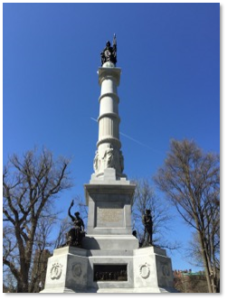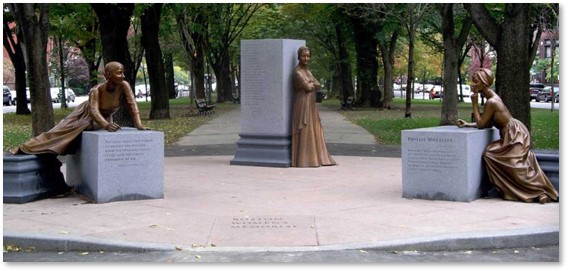March is Women’s History Month, which usually reminds me how often the history of influential women in Boston has been overlooked. We have many monuments for dead white men, some of whom no one remembers, statues of men playing almost every sport known to man, a statue of a pear and a plaque about potatoes, but darned few memorials to women.
The Women Behind the Men
Keep in mind that the Puritan men didn’t cook their own meals or wash their own clothes. Boston’s merchant princes didn’t bear and raise their own children. The men behind the Revolution were backed up by women who took care of their homes and children. Ditto the sports heroes, ministers, war heroes and politicians we encounter in bronze around the city.
Women not only did those things, some of them managed to achieve outstanding accomplishments in addition. We don’t find many statues of them out standing in the city, however.
Who’s On the List
Following is a list of memorials to women that you will find around the city—although you may have to look hard to locate one or two.
-
I did not include allegorical statues such as “Columbia” atop the Soldiers and Sailors Memorial on Boston Common or “Art” and “Science” by Bela Pratt in front of the Boston Public Library. As beautiful as these are, they don’t honor women who lived in or served Boston.
- Neither did I consider statues of an anonymous woman, such as “Bacchante” by Frederic MacMonies in the BPL’s courtyard fountain. She’s beautiful but anonymous.
- I did add the statues that represent groups of women who were important to Boston, even if the statue does not depict an individual.
- “The Embrace” does not appear here because we see only Coretta Scott King’s arms in a statue to her husband.
Commonwealth Avenue Mall
Boston Women’s Memorial
- Location: Commonwealth Avenue Mall between Fairfield and Gloucester streets
- Sculptor: Meredith Bergmann
- Honoring: Abigail Adams, Lucy Stone, Phillis Wheatley
Each of the three notable women in this monument lived in Boston for a time. Abigail Adams was the wife of the second president of the United States and the mother of the sixth. She was a perceptive social and political commentator and a strong voice for women’s advancement at a time when women had few rights and their lives were ruled by men. Phillis Wheatley was an enslaved woman and the first African-American female poet to have her work published. Lucy Stone was one of the first Massachusetts women to graduate from college. An ardent abolitionist and renowned orator, she founded the Woman’s Journal, the foremost women’s suffrage publication of its era.
Massachusetts State House Lawn
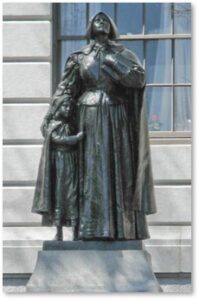 Anne Hutchinson
Anne Hutchinson
- Location: State House Front Grounds
- Sculptor: Cyrus E. Dallin, 1915
Anne Hutchinson has been called “America’s Founding Mother” and for good reason. If you don’t know anything about her, I highly recommend reading “American Jezebel” by Eve LaPlante.
Anne Hutchinson spoke out in defiance of Boston’s ministers and Governor Winthrop on matters of religious doctrine — backed up by her extensive knowledge of the Bible. Convicted of heresy and banished from Boston, she chose to walk to what is now Portsmouth, Rhode Island, while heavy in her 19th pregnancy.
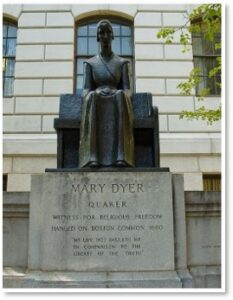 Mary Dyer
Mary Dyer
- Location: State House Front Grounds
- Sculptor: Sylvia Shaw Judson, 1959
A Puritan woman who became a Quaker missionary at a time when Quakers were banned in Boston, Dyer stood up for her beliefs. She was banished from Boston several times, demanded to be hanged with two of her fellow Quakers, and was eventually executed on Boston Common for violating Boston’s “Bloody Laws” by returning to the city.
I am delighted that this statue exists to challenge our memory of the Puritan theocracy but I do wish that Sylvia Shaw Judson had not posed Mary Dyer sitting down with her hands in her lap. I don’t think that does justice to the spirit of this courageous woman.
Massachusetts State House
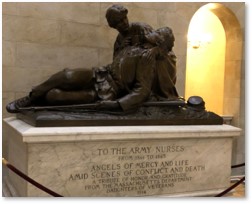 Civil War Army Nurse
Civil War Army Nurse
- Location: Nurses Hall
- Sculptor: Bela Pratt, 1911
This statue commemorates the courageous and hard-working nurses who worked on battlefields during the Civil War. “Angels of mercy and life amid scenes of conflict and death.”
“Hear Us:” Massachusetts Women’s Leadership Memorial
- Location: Mass. State House – Doric Hall Corridor
- Creators: Sheila Levrant DeBretteville, Susan Sellers, and Robert Shure, 1999
- Honoring: (Plaques) Dorothea Dix, Lucy Stone, Mary Kenney O’Sullivan, Josephine St. Pierre Ruffin, Sarah Parker Remond, and Florence Luscomb.
Clara Barton
- Location: Nurses Hall
- Sculptor (Plaque): Robert Shure
A native of Oxford, MA, Clara Harlowe Barton was a teacher, self-taught nurse, and founder of the American Red Cross.
Downtown Crossing
Boston Irish Famine Memorial
- Location: 15 School Street
- Sculptor: Robert Shure, 1998
These two groups of statues contrast an Irish family suffering during the Great Famine of 1845–1852 with a prosperous family that had immigrated to America. It marks the Gaelic contribution to the city and to Massachusetts.
The South End
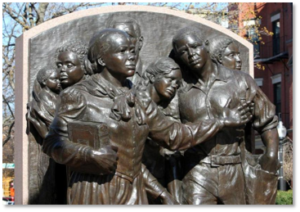 Harriet Ross Tubman Memorial (Step on Board)
Harriet Ross Tubman Memorial (Step on Board)
- Sculptor: Fern Cunningham
- Location: Harriet Tubman Park
This 10-foot bronze statue depicts the former slave and subsequent abolitionist leading slaves to freedom by inviting them to step on board the Underground Railroad.
Emancipation
- Sculptor: Meta Vaux Warrick Fuller, 1931
- Location: Harriet Tubman Park
This statue shows a freedman and freedwoman moving out of slavery and into the world as active agents of their own lives, independent of white support or patronage.
The Public Garden
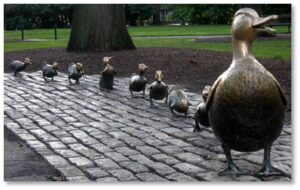 Mrs. Mallard
Mrs. Mallard
- Location: Public Garden
- Sculptor: Nancy Schön
Okay, she’s a duck. And fictional. But Mrs. Mallard is probably Boston’s most famous mother and her statue draws thousands of tourists every year. While Mr. Mallard takes a trip up the Charles River, she leads her children on a risky journey to a safe new home in the Public Garden’s lagoon. Mrs. Mallard typifies Boston’s feisty women.
Suggestions for Women’s Memorials
Those are all the women’s memorials I could find in Boston. Is this enough? Somehow, I think Boston’s history offers more women worthy of a memorial. Here are some suggestions:
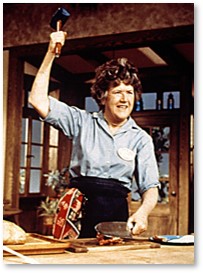 Fannie Farmer: Founder of the Boston Cooking School and writer of an influential cookbook, she provided scientific explanations of the chemical processes that occur in food during cooking, and helped to standardize the system of measurements used in cooking in the USA.
Fannie Farmer: Founder of the Boston Cooking School and writer of an influential cookbook, she provided scientific explanations of the chemical processes that occur in food during cooking, and helped to standardize the system of measurements used in cooking in the USA.- Julia Child: the woman who introduced French cuisine to America through her cookbooks and television show, and taught Americans how to eat well.
- Christa McAuliffe: the first civilian sent into space, who died in the 1986 Challenger disaster.
- Lydia Pinkham: inventor of her eponymous Vegetable Compound, the first patent medicine created specifically to relieve women’s complaints, which male doctors either ignored or treated with painful surgery.
- Cornelia Wells Walter: the first female editor of a major daily newspaper, the Boston Evening Transcript
- Annie Burton: a formerly enslaved woman who became an entrepreneur, restaurateur, and author
Who would you nominate for future memorials to women?
